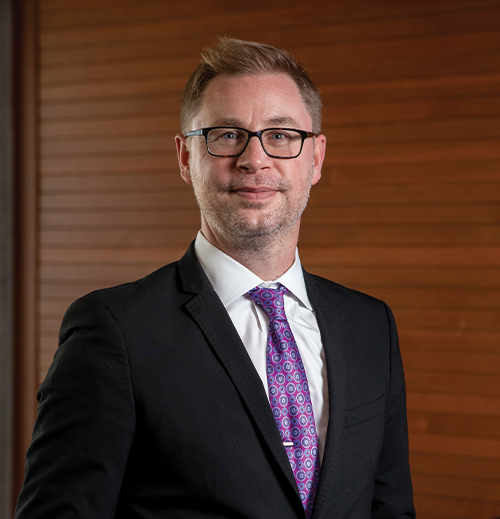A Profound Interest in What Makes You Sick
Department of Medical Laboratory Sciences chair Matthew Nicholaou’s interest in infections can quickly lead to a fascinating, insightful, “wait, let me find a notebook” discussion.
When asked how antiretroviral therapy can help an HIV positive woman give birth to a child without the infection, he explained that “It essentially makes people at risk…almost immune to the disease because the drugs are present in such a quantity that the virus can’t ever really establish that chronic infection.”

While all infection and immunology-related topics are on the table, HIV/AIDS is an important topic for Nicholaou, who was 12 when he lost his father to the virus.
“That was during the heart of the AIDS epidemic,” he said. “It was a difficult time in our country, but, for me, there was a silver lining. It gave me my drive in life.”
After earning his bachelor’s degree in medical technology, he worked at the Children’s Hospital of Philadelphia for four years in clinical microbiology before attending graduate school at the University of Pittsburgh where he earned his doctoral degree in public health. There, he studied the side effects of HIV infection and how highly active antiretroviral therapy (HAART) impacts metabolism, lipid levels and other health factors.
At Weber State, he teaches students about clinical microbiology and molecular diagnostics, immunology, biostatistics and laboratory research to diagnose illnesses.
Amid the COVID-19 pandemic, his vast knowledge of infections made him a key member of Weber State’s COVID-19 Task Force. While the Annie Taylor Dee School of Nursing led a team of volunteers to administer COVID-19 tests on campus, Nicholaou led the team interpreting the results.
“We did over 17,000 tests,” he said.
Alongside health sciences professor Jim Hutchins and microbiology professor Daniel Clark, Nicholaou taught a course on the immunology of COVID-19, primarily for non-science majors, in spring 2021. The professors explained how the immune system works, how the virus spreads, and why particular public health measures are in place.
In his medical laboratory sciences classes, Nicholaou creates opportunities for students to conduct their own research and present their findings at symposiums. He also trains students in using the latest medical laboratory technology, including the CRISPR gene editing tool, which can be used to target and kill harmful microbial infections.
Recognizing his dedication to students and the community, the Dr. Ezekiel R. Dumke College of Health Professions named Nicholaou the Dumke Endowed Chair for 2021. With the recognition, his department will receive $30,000 over three years. Nicholaou plans to use the funds to update lab instrumentation and reach more students in rural communities through distance education, including those in Utah, New Hampshire and Arkansas.
In fall 2022, the department will launch a postbaccalaureate certificate that will allow students with an undergraduate degree and the correct prerequisite science credits to gain the skills they need to work in a clinical laboratory within nine months to a year.
“Weber provides a doorway for a lot of people to make advancements in their lives and careers,” he said, “and our department is a perfect example of that.”
For more information about Weber State’s COVID-19 response, visit weber.edu/coronavirus.
